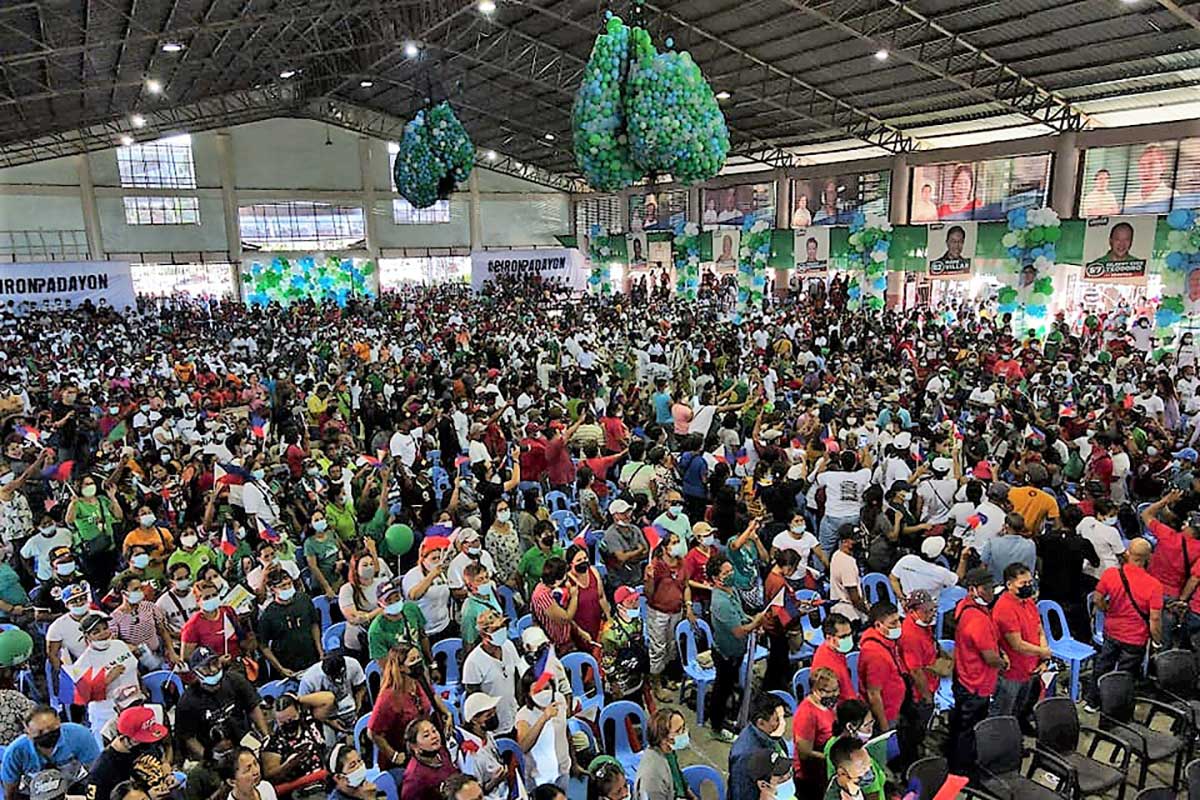
By Francis Allan L. Angelo
All politics is local.
This is the stand of an Ilonggo political analyst when queried on the “divide” between the seemingly insurmountable lead of presidential bet Ferdinand Marcos Jr. in poll surveys and the massive rallies of his chief rival, Vice President Leni Robredo.
Prof. Ramon Casiple, executive director of the Institute for Political and Electoral Reform, said the more serious campaign began Friday, March 25, 2022, the kickoff of the campaign period for local candidates.
“The start of the more serious campaign began today (Friday). The surveys after today will reflect what will happen on election day (May 9, 2022),” Casiple said.
He cited the 2016 presidential race which incumbent Pres. Rodrigo Duterte won despite lagging in poll surveys.
“Last election, President Duterte topped the survey in the third week of April 2016 and eventually won the election in May. In the case of Vice President Robredo, the edge of then vice-presidential bet Marcos in the surveys was very big but we knew who won.
On May 9, 2016, Vice President Leni Robredo edged out former Sen. Ferdinand “Bongbong” Marcos Jr. by 263,473 votes.
On May 27, 2016, Robredo was declared the winner after the closing of the canvassing of 166 certificates of canvass.
Based on the official count of Congress sitting as the National Board of Canvassers, Robredo garnered a total of 14,418,817 votes while Marcos finished second with 14,155,344 votes.
Casiple said voters get more serious in sizing up the candidates and their platforms when the campaign in the local level begins.
“There is a pattern that when local campaigns begin, people are more serious in analyzing the intentions of the candidates. Before this day, we have propaganda and talks. Surveys are not that reliable,” he added.
Casiple also noted that a lot of things could still happen before the election, particularly changes in the presidential race.
He cited the case of Senator Panfilo Lacson who quit his party, Partido Reporma after a faction led by former House Speaker Pantaleon Alvarez decided to endorse Robredo.
“That is not just one event that could happen until election day. People are now getting serious about the elections starting today.”
The movements and decisions of local candidates during the campaign period does not only matter but would be a decisive factor in the presidential race.
“Voters are now asking if who the best candidate is. The atmosphere is now very serious and national politicians are now looking into these choices as these will affect their fates,” Casiple said.
But can Marcos Jr.’s rivals be able to surmount his lead in the surveys?
“That already happened in the last vice-presidential election. Marcos’s lead at that time was the same in the presidential race today. The point is that the more serious campaign and decision-making is just starting. Surveys a month or two months ago will not decide the outcome. President Duterte himself only topped the survey third week of April and he eventually won.”
When asked if Marcos Jr. can secure the presidency if he maintains his lead well into April, Casiple said the survey results that will come out after March 25 would be the more realistic gauge of the May 9 elections.
“This is not a simple case of trending. This is now the time that voters are getting more serious,” he added.
PREACHING TO THE CONVERTED?
As to the massive and energetic rallies mounted by Robredo, Casiple said rallies do not promote certainty in the elections.
“It can only be indicative in the context that in one area, the candidate might have a lot of voters,” he added.
Casiple cautioned that images of massive rallies do not reflect the actual number of voters who will cast their ballots in May.
“Let’s look at the number of voters. You can be sure that the actual voters are more than those who attend rallies. Rallies are important as an indicator, but it is not decisive. It does not mean that if a lot of people attend the rallies, you will get more votes in an area. It’s just indicative,” he added.
Is attendance to debates a factor in the presidential race?
Casiple said this is the first time in Philippine elections that the forerunner in surveys refused to attend debates organized by the Commission on Elections and other institutions.
“My forecast is absence from debates will have an effect on candidates because the people are now getting ideas, especially with our problems with the pandemic and the economy. What are these candidates thinking of and planning to do? If you don’t show up in the debate, you will only be limited to rallies and caravans which is not an assurance that you will get more votes in other areas,” he said.
He added that debates aired in the media can access a lot of voters, especially opinion makers in the communities.
Surveys also indicated that 80 percent of Marcos Jr.’s likely voters will not change their minds come election day.
Casiple said such statistics are normal in surveys, even in previous elections “but even if the survey says that you are sure to win, the more certain things will happen on the last days of the campaign.”
“The start of the local campaign is the time that people will make a more serious decision on election day. As election day nears, people can still change their minds until they firm up on May 9.”



















